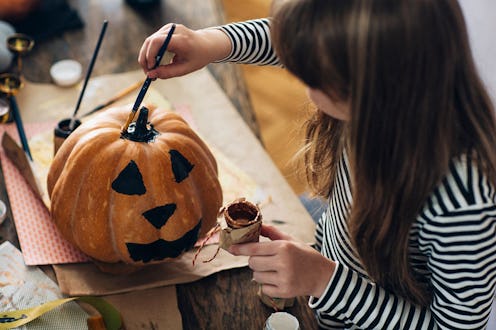We know Halloween means a day filled with spooky costumes, candy both chocolate-filled and chalky, and fun decor — but what does the word "Halloween" actually mean? While most holidays almost give away the meaning of the day in the title (as in, Christmas is a combination of "Christ’s Mass") Halloween seems just a little bit different. I mean, there's a thing called a hallow, but besides the name of a band, what's a ween?
First, let's talk about All Saints’ Day. Celebrated on Nov. 1, the day is a Catholic holiday which honors the saints of the Catholic Church. Typically Catholics observe the holiday by attending mass, and while originally celebrated in May, it was moved to November by Pope Gregory III. As you might know, Halloween falls the day beforehand — Oct. 31, to be exact. In accordance with All Saints' Day, Halloween was then called All Hallows’ Eve, and seemed a bit less... well, commercial. All Hallows' Eve was definitely an event that each community celebrated, and it was usually pretty kid-friendly.
Then, of course, there was Samhain, celebrated by the Celts. Samhain, pronounced as "saw-en," was best known as both the beginning of winter, as well as the day ghosts came back from the dead.
These ghosts usually caused a little bit of chaos, which was actually expected and even praised — in fact, the ghosts were often given treats. That's likely where the spooky, eeriness of Halloween derived. It was so ghostly that even Glenn Danzig was inspired by the name, starting up a band called Samhain in the 1980s. But that's just a random fun fact.
Halloween eventually became more about fun food and celebration (and less about hauntings) in the 1920s. Not to say that events like bobbing for apples aren't fun, but — well, every holiday goes through a set amount of changes throughout the years.
Halloween today, as a word, was pretty much formed based on All Hallows' Eve — say it out loud real quick, and the new name might make a bit more sense. That, and the fact that Hallow stands for "holy" in Old English, and — remember "Samhain" being pronounced "saw-en"? The word in general means "end of summer," and as the holidays merged, it might have derived from there.
It's definitely important to know that while we think of it as an American holiday, it actually started in Celtic-European culture — Americans just adopted it, and made it what it is today.
Images: Lumina/Stocksy; Giphy (2)
